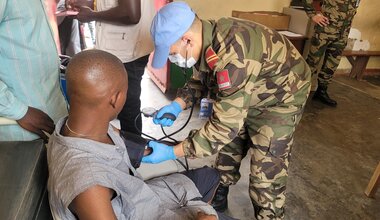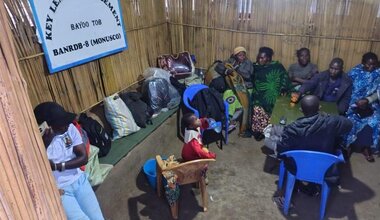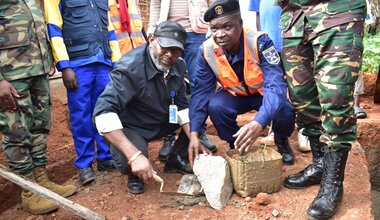Interview: General Babacar Gaye on Radio Okapi
Goma, 3 December 2012 – While visiting Goma in Nord Kivu province, from 1 to 2 December 2012, General Babacar Gaye, Head of the Military Department of Peacekeeping Operations and Chief Military Advisor to the United Nations Secretary-General, gave an interview on Radio Okapi.
RADIO OKAPI: WHAT ARE THE REASONS FOR YOUR VISIT HERE IN NORD KIVU? WHAT IS THE PURPOSE OF YOUR STAY?
BABACAR GAYE: Mr. Ladsous [Hervé Ladsous, Under-Secretary-General for Peacekeeping Operations], sent me here in my capacity as Head of the Military Department of Peace-keeping Operations, to express the support of the Department to all United Nations military, police and civilian staff currently deployed in Goma. These staff members have gone through some tough times, and they have, by their presence, given maximum support to the population, the primary victims of the recent development which took place in Kivu and particularly in Goma. I am also here to see with the military staff of the Nord Kivu Brigade, how they will implement the tasks prescribed to them by the Security Council and this, in relation to the last decisions taken at the last Summit in Kampala. So, this a process aimed at bringing support and evaluating the situation. In addition to that, there is the evaluation of what we are doing at MONUSCO during this period. And I have to say that we commend all our staff for what they have been able to achieve so far.
Q: WITH REGARD TO THE EVOLUTION OF THE SITUATION, THE M23 REBELS HAVE LEFT THE CITY. WE HEAR THAT THE FARDC ARE RETURNING TO GOMA TODAY. IF THIS IS CORRECT, UNDER WHICH CONDITIONS WILL IT HAPPEN?
Actually, it was agreed at the last Summit in Kampala that a battalion of the FARDC would return to Goma, and that the police force would be deployed again. I think the police are already deployed. There were a few incidents upon their arrival but these have already been sorted out. I also think that the army Chief of Staff, General Olenga, does not intend to rush through the process, but is very keen that the battalion to be deployed is well prepared, that it should perform well and help to reassure the population. That's the real challenge today.
Q: YOU HAVE SPOKEN ABOUT EVALUATING THE WORK OF UN PEACEKEEPERS. THE POPULATION WOULD LIKE TO SEE THE UN PEACEKEEPERS' MANDATE BETTER ADAPTED TO THE CURRENT SITUATION. DO YOU THINK THAT MONUSCO'S MANDATE WILL BE REVIEWED IN LIGHT OF THE CURRENT SITUATION?
Only the Security Council can provide the mandate, and it is the Council which is responsible for reviewing that mandate. It is true that there is, within the Security Council, the intention to consider several options for the future of the Force. This is consistent with the request made by [the Security Council, through its] Resolution 2006 to the Secretary-General; and, in fact, there is today a process of reflection underway on what MONUSCO's actions will be tomorrow. But it is important to know that everything being done in the peacekeeping field is done in partnership between the Security Council, the troop-contributing countries and, finally, the Secretariat which does the preliminary work. And of course, upon my return [to New York], I will submit my observations, feelings and impressions regarding this development.
Q: WHAT IS YOUR MESSAGE TO THE PEOPLE WHO BELIEVE THAT THE REBELS HAVE NOT WITHDRAWN FAR ENOUGH FROM GOMA, AND FEAR THAT IN CASE OF FAILURE IN THE NEGOTIATIONS, AND THE DIPLOMATIC AND POLITICAL EFFORTS UNDER WAY, THE REBELS WILL COME BACK?
As you may know, addressing the population is the responsibility of this country's legitimate Government, elected officials, representatives of the population. But as a UN military officer, I can nevertheless assure the population of the peacekeepers' determination to carry out their mission to the best of their ability. And that is what they have done during this period. Now, certain symbols, such as seeing non-governmental troops enter a regional capital -- this is, of course, an image that deeply affects the population -- but this image must not overshadow all the actions that the peacekeepers have conducted along this Rutshuru-Goma axis -- an axis which saw the same development four years ago. There is a recurrence of problems, which proves that these problems must be resolved by addressing their root causes, and that one must not just stop at the symptoms. I know there is suffering among the population, and frustration among the authorities at seeing non-governmental troops enter their regional capital. But a sense of moderation and perspective is required in weighing MONUSCO's action.
Interview conducted by Sifa Maguru/ Radio Okapi/ MONUSCO
 UN
UN United Nations Peacekeeping
United Nations Peacekeeping




